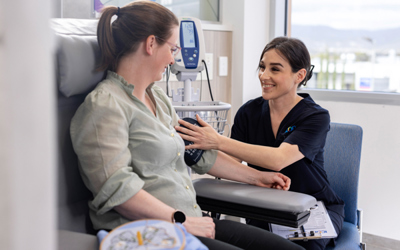Quick facts about head and neck cancer
Most head and neck cancers begin in the thin, flat cells of the lining of the throat, mouth and nose. These cells are known as squamous cells
Not all tumours in the head and neck are cancerous
Cancer Research UK states that there are around 12,800 new head and neck cancer cases diagnosed in the United Kingdom every year, making head and neck cancer the 8th most common cancer in the region.
Types of head and neck cancer
Cancers of the head and neck include the following areas:
-
Mouth (oral cavity)
This includes the lining of lips and cheeks, hard palate and the first two thirds of the tongue, as well as the gums and tonsils
-
Larynx
This is also known as the voice box, and contains the vocal cords used for making sound. The larynx connects the windpipe (tube that connects to the lungs) with the lower part of the throat
-
Pharynx
The pharynx is also known as the throat. Cancer can affect any three areas that make up the pharynx including:
Nasopharynx – This is the upper part of the throat, behind the nose
Oropharynx – This includes the base of the tongue to the tonsils in the back of the throat
Hypopharynx – This is the lower region of the throat, including behind the voice box
-
Nasal cavity and sinuses
The nasal cavity is the area inside the nose. The area behind the nose consists of four sinuses which impact on the sound and tone of speech.
-
Salivary glands
This is where saliva is produced to help digest food and protect against infections. Most of the tumours found here are typically benign (non-cancerous).
Cancers of the brain, thyroid gland, eye and oesophagus are not included in the classification under ‘head and neck’ cancer.
Signs and symptoms of head and neck cancer
As signs and symptoms for head and neck cancer can be similar to other common conditions, it’s important to see your GP or healthcare professional if you experience any of the symptoms below. Discussing anything concerning with your doctor as soon as possible can help give you peace of mind and offer the best chance of successful treatment if you receive a head and neck cancer diagnosis.
Symptoms may include:

Headaches

Bleeding in the nose/mouth area or coughing up blood

Pain of any kind or a lump in the mouth or neck area

Ongoing sinus infections

Pain with chewing or swallowing

Ongoing blocked nose

Loss of senses such as smell, having double vision or difficulty hearing

Patches of white or redness in the mouth area (i.e. tongue, lining of mouth and gums)
Stages of head and neck cancer
The TNM system is used to stage head and neck cancer, and it helps doctors understand what your cancer looks like. The TNM stands for:
Tumour – Describes the size of the tumour and the extend the cancer has spread
Node – Describes whether the tumour has spread to nearby lymph nodes. Nodes can be graded from N0, where the has been no spread, through to N3, where the cancer has spread to other lymph nodes
Metastasis – Describes whether the cancer has spread to other areas of the body outside of the lung. Metastasis can be graded from M0, where there has been no spread through to M1c, where the cancer has spread to other organs of the body and produced additional tumours.
Treatment for head and neck cancer
There are many different types of treatment for head and neck cancer. Your treatment will depend on you and your cancer.




